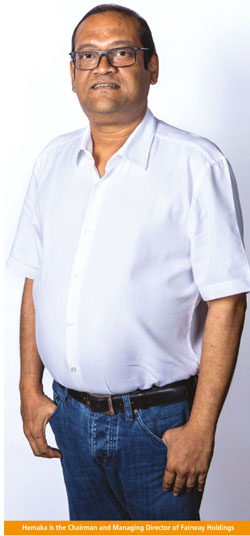REAL ESTATE
SHORT TAKES
Compiled by Savithri Rodrigo

Q: How is the real estate sector performing in the present context?
Suresh Rajendra (SR): It is experiencing exponential growth that’s primarily driven by urbanisation with significant changes in trends from landed housing to condominiums. Commercial real estate – especially office space – is also a high-growth segment.
Hemaka de Alwis (HDA): There is a bubble at the upper end of the property market while the middle and lower ends are bottomless pits. Commercial properties remain a no-go zone for most developers as the returns are low. But there are opportunities in the leisure sector.
Q: Which key factors drive demand for residential developments?
SR Urbanisation, population growth, economic progression, increased affordability and changing lifestyles. Real estate is also considered to be a safe and secure form of investment with steady growth and returns, and as an effective hedge against inflation.
HDA Being an affordable housing solution, apartments are a relatively safe and profitable investment – and most importantly, a bank-accepted security. Convenience, liquidity compared to other real estate investments and a perception that the real estate sector performs better when other investment options are running low are key factors.
Q: How must catering to the demand for commercial real estate be balanced with residential concerns?
SR Demand will drive market dynamics. The residential market will always enjoy a steady demand that’s influenced by affordability and interest rates. And commercial real estate will be driven by economic growth.
HDA Both are demand driven. I don’t believe in large-scale mixed developments as they haven’t worked. Zoning for residential, mixed and commercial developments is important, and to which companies must strictly adhere.
Q: What are the main challenges facing the real estate sector?
SR High interest rates, a depreciating currency, the severe shortage of labour in the construction industry, and the high cost of land and construction.
HDA High taxes, the recent withdrawal of most Board of Investment (BOI) concessions, regulatory issues, oversupply, a lack of clear policies, the absence of a regulatory framework and archaic planning regulations.
Q: Is there a glut in the luxury segment?
SR This segment is supply driven, which indicates that demand will always be high as witnessed by economic development and urbanisation in other Asian capitals.
HDA The entire sector is based on demand and supply. A correction will occur soon with many of these assets losing value.
Q: How is government policy affecting the real estate market?
SR Focussed and effective policy will make housing for a larger population achievable. And infrastructure projects will expand cities. The government has also embarked on relocating unauthorised and unplanned housing thereby making land available for development.
HDA This is a double-edged sword; one being the financial edge; and the other is the regulatory aspect. I am not sure which is sharper.
Q: In what ways can the authorities help promote investment in real estate?
SR Real estate investment trusts (REITS) will broad-base ownership and drive investment while lower interest rates and longer loan repayment periods will address housing needs. Moreover, a planned and structured release of state land for development will temper land costs while investing in infrastructure will transform demographics, and create new satellite cities and townships.
HDA The government must stop seeing itself as a real estate agency and act more like a development agency.
Q: To what extent do property seekers rely on real estate brokers’ recommendations?
SR In a market where information is freely available and reliable, the role of the broker has diminished. The need is for professional real estate agents who avoid speculation and advise clients with genuine information.
HDA I hope they don’t. They cannot be relied on to have the customer’s interest at heart and have no reputation to safeguard or foster.

Q: From a property owner’s perspective, what factors should be considered when selecting a property broker?
SR There are many ways to approach the market both as buyers and sellers – and a broker is one of them.
HDA It’s important that personal references are obtained. ‘Buyer beware’ should be the policy that’s followed. And clients must be ready to accept a property ‘as is, where is’ when it comes to dealing with most of their ilk.
Q: How can Sri Lanka address the dearth of qualified real estate professionals?
SR Training and knowledge are vital. Most developed countries require agents to obtain a licence to sell real estate. Sri Lanka has no such requirement.
HDA A certificate course or diploma from a recognised university or an external education institute would be ideal. The advent of international real estate brokering agencies here has also infused a degree of professionalism to the sector.
Q: Is the real estate bubble likely to burst sooner rather than later as suggested by some business and industry watchers?
SR There is overconcentration in some segments and underservicing in others due to commercial reasons that will even out. Condominium living will become increasingly popular especially for city living and the commercial real estate market will grow in keeping with economic acceleration.
HDA Many high-end developments in Colombo’s central business district and other locations like Hambantota were undertaken in anticipation of plans and promises that would materialise. But these have yet to take place.
Q: What lessons can Sri Lanka learn from real estate bubbles elsewhere?
SR Real estate bubbles are created due to financial markets overextending credit. In Sri Lanka, the exposure of financial institutions to real estate remains in single digits so there is minimal exposure. The demand for housing in the luxury segment especially may become tempered in the short term because developers with unsold stocks could resort to discounting. However, the bubble is unlikely to burst in a growing market such as ours.
HDA The war placed us in a time warp. Others have made costly mistakes and we must learn from them. We must only shop for good ideas in the global supermarket and not be carried away by the belief that there are still ‘firsts’ to be achieved. The world isn’t that dumb and we aren’t that smart!






Leave a comment